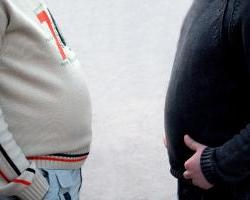Obesity in Adults
 Obesity refers to an excess of body fat, putting affected individuals at risk for chronic illnesses such as type 2 diabetes, hypertension, heart disease, stroke, and certain types of cancer.
Obesity refers to an excess of body fat, putting affected individuals at risk for chronic illnesses such as type 2 diabetes, hypertension, heart disease, stroke, and certain types of cancer.
In America, one quarter of all adults are obese. Women generally have more body fat than men, so are allowed a greater percentage of body fat before being labelled as obese. A certain amount of body fat is useful as it provides insulation to keep us warm, shock absorption in case we fall, and stored energy if we experience a shortage of food. Women with more than 30 percent body fat and men with greater than 25 percent body fat are considered to be obese by health care professionals. Occasionally, someone with a lot of muscle will appear to be obese, when they are actually just overweight.
Obesity occurs when a person takes in more calories than he or she needs. However, calorie requirements differ between individuals, and other factors may play a role in determining how efficiently our bodies use food. Other causes that contribute to obesity include genetics (heredity), environment, psychological issues, certain illnesses, or medications.
It is estimated that 280,000 adult deaths in the US are linked to obesity. In addition to this, obesity causes a great deal of emotional suffering, embarrassment, and shame. Modern society places an emphasis on thin, lean body types, especially for women. This tendency to link slimness with attractiveness can have devastating consequences among people struggling with obesity. Obese adults suffer a great deal of unhappiness from discrimination, resulting in feelings of hopelessness and depression.
Obesity is considered to be a serious health condition. Treatment includes diet, exercise, behavior modification, and medication. Gastric bypass surgery may be suggested in cases of severe or morbid obesity, in order to manage this life threatening condition.
 Eating Disorder Self Test. Take the EAT-26 self test to see if you might have eating disorder symptoms that might require professional evaluation. All answers are confidential.
Eating Disorder Self Test. Take the EAT-26 self test to see if you might have eating disorder symptoms that might require professional evaluation. All answers are confidential.